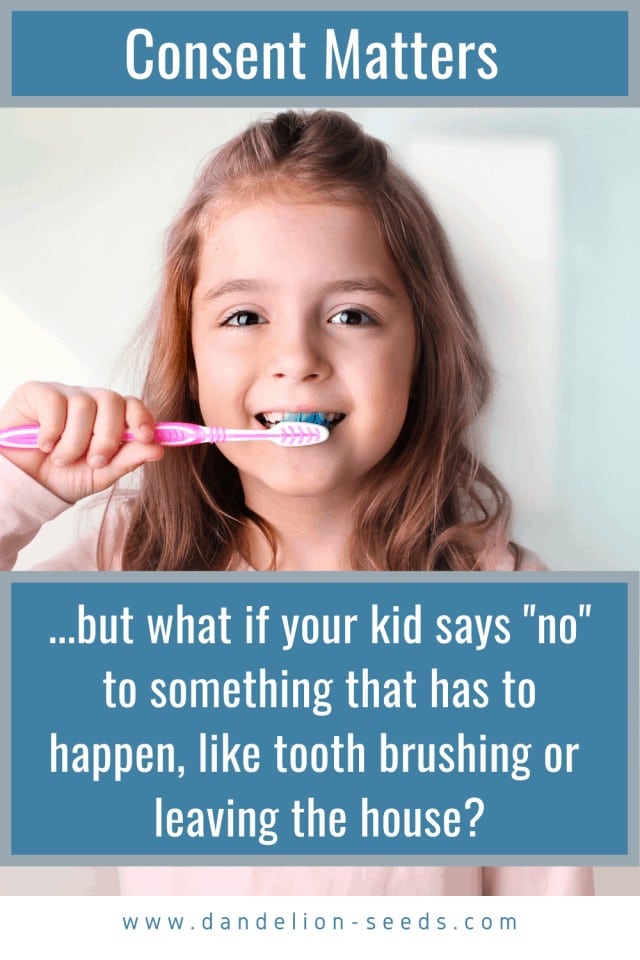
Sign in
Don't have an account with us? Sign up using the form below and get some free bonuses!

Bodily autonomy (the concept of being in charge of one's own body), related to consent (choosing to say yes or no to any activity), can be a tricky topic for parents. We want our children to have healthy boundaries for their physical, emotional, and sexual safety. At the same time, we're their parents, and we have a responsibility to take care of them. What happens when our children say "no" to the care we're trying to provide? They have to brush their teeth, right?
These suggestions can help you foster an environment of cooperation and mutual respect -- while giving them an important sense of bodily autonomy.

It's often helpful to investigate our motivation for the Things-We-Feel-Must-Happen. Sure, if you know that
your children played in the dirt today, you might feel grossed out if they refuse their nightly bath. However, there’s likely little risk that skipping the bath for a night (or more) will do any real harm. In fact, a little dirt might be good for their health.
It might feel mandatory because it’s what your routine has always been. Shifting routines can be jarring. Once you question your thinking, however, you might find more flexibility in whatever the issue seems to be.
If it’s not really mandatory, let it go.

Afflinks. As an Amazon associate, we earn from qualifying purchases. Your purchases help us support important charities.
For mandatory activities that affect bodily autonomy, we sometimes apply the “ask for your children’s consent” approach too liberally. If an activity related to bodily care isn’t optional, don’t present it as such.
You might ask, for example, “Can we brush your teeth?” If you say that, you're setting yourself up for a no-win situation if your child declines. Either you end up needing to force the action (that’s not consent or bodily autonomy — forced compliance sends the wrong message) or you agree with their “no” and give your child an unhealthy amount of power.
Offering choices about caring for the body can help. You could say something like, “Would you like to brush

your teeth before or after story time?” It needs to happen, but there’s flexibility in when it happens.
Alternatively, you could let your child know when it’s almost time (a few minutes to mentally prepare is helpful). For children who are too young to have a good sense of "minutes," frame it in understandable terms, such as, "After the amount of time it would take to watch one cartoon, we'll brush your teeth." Then, proceed confidently and peacefully. Your vibe will set the stage for how your child responds.
It lessens children's anxiety towards the dreaded activity if they know when to expect it. "Every day after breakfast, we brush, then we play." It's also helpful to have a consistently positive "after" plan (such as the "then we play" here) sorted out so they don't fixate on the part they're dreading. Include them in deciding what to do afterwards. Joint decision making is part of bodily autonomy.
“I’ll wait until you’re ready” is a powerful tool for consent. What might feel like no big deal to you might really be worrisome your child. If you see any sign of anxiety in your child's body (facial expressions, retreating, etc.), pause.
That doesn’t mean your child gets to go play for three hours while you wait with the toothbrush in hand; it means you patiently wait alongside your child wherever the event needs to happen. Trust that your child needs a moment to adjust to whatever is about to transpire.
If he or she wants to go do other things, you can lovingly and firmly say, “Your game happens next; it’s time to brush teeth first. I’ll sit here with you until you’re ready.” Then, as hard as it is, don’t pressure. Sometimes, we all just need a moment to get in the right mindset. Remember that you're united as a team here. Avoid power struggles.
This is pretty much the golden approach to any tricky parenting situation, including bodily autonomy. Whenever you can, frame mandatory tasks fun and positive. Give your child the first turn at washing his or her face, turn the bath into a splash party (after all, water is just water, right?), and try whatever else you can to ease the tension. We adults are often far too serious! Play is magical.
Another helpful option is that “Whatever you do…” game. Here, you feign shock, horror, or disbelief as you tell your child, “We’re going to play an opposites game. I’m going to pretend I don’t want you to do something that I actually do want you to do. So…whatever you do, do NOT brush your teeth! Noooooo…not with toothpaste! Toothpaste is terrible!” Seeing a glimmer in your eye, your child will likely play along, happily “breaking the rules” of the horrible event you’ve jokingly forbidden.
Note that there’s a difference between tricking your child and playing together. Games like this generally work best for children who are old enough and whose sense of humor has developed. Be totally transparent about your agenda. We don't send a positive message about bodily autonomy if we trick someone into compliance. In a game like this, you're united in the goal while they still feel protected and "in charge" of their body.
Oftentimes, children are more reluctant to cooperate if they feel they haven't had enough "say" in their day.

Every child needs to feel he or she has a voice that matters; rights about his or her own body; control over their health (even if they don't frame it that way yet). They need us to include them in their care. Some ways to give your child opportunities for consent about their body include these:
Ask them overtly (with words) or silently through your body language, “Is it okay if I…
If they say "no," you simply don't do it. It also means that when kids they say things like this, you comply immediately unless it's a safety issue:
It also means that we don’t play games like “You must pay the ‘toll’ before you can leave my arms.” (“Payment” is usually a hug or a kiss, which is the antithesis to bodily autonomy.) No child should learn that forced physical act of affection (even in jest and not sexual) is “payment” for bodily freedom. We’re planting dangerous seeds when we do that. The principle of consent related to their body doesn't disappear during games, regardless who's playing it (parent, friend, or care giver). Children must feel secure and protected in our care. Play is how they learn. They're learning about bodily autonomy and human rights with every interaction.
By respecting their bodies now, they learn the important principle that their bodies are worth respecting. We're the ones who are modeling whether their "no" has a voice in the world.
Some truly non-negotiable tasks, such as making an important community event on time, might just need to happen. Support and validate your child’s feelings, assure him that you hear their position, and move forward.
Revisit the conversation when you're in a good place to debrief. Assure children that you're a united front; you're on their side. Your child's well being might take precedence over your punctuality. And sometimes, your child just needs you to listen without “solving” anything.
If you search your child’s heart with compassion, you’ll naturally align and connect about bodily autonomy / bodily consent and all sorts of other issues. From that alignment comes problem solving. For “easier” things like tooth brushing, you might learn that the water is usually too cold or too hot (or as one little boy I know complained, the water was “too wet”). I wish them well with that one. Many of what seem to be the biggest problems are easy to solve once you hear your child’s perspective. Only good things can come from understanding our children’s hearts.
With every interaction, you're setting the stage for their perceptions of bodily and human rights; teaching them their sexual and reproductive rights, and laying the foundation for positive relationships with others as they grow.




Sarah R. Moore is an internationally published writer and the founder of Dandelion Seeds Positive Parenting. You can follow her on Facebook, Pinterest, and Instagram. She’s currently worldschooling her family. Her glass is half full.